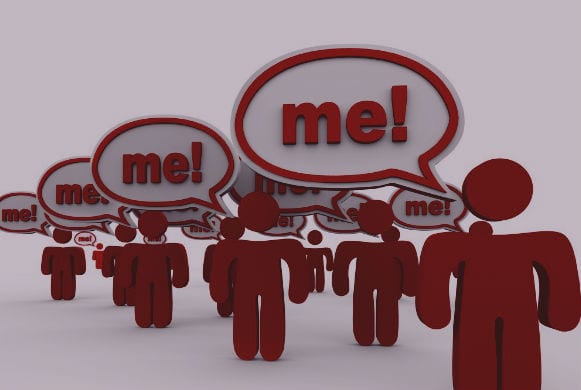The truth is that we all like to have our things. You don't have to be a genius or a psychologist to know about the attachment that people are capable of feeling towards their material goods.
It is very common for it to happen, especially if we have worked hard to get them or if we feel some kind of personal attachment to that something because it was left to us by someone we care about or who has a lot of sentimental value for us. However, sometimes we get too excited or attached to material things, and our way of being does not allow us to share them with the rest. This may not be the case only when we talk about material goods. Selfishness can occur in a good number of aspects of our daily life.
When we are children, we generally behave selfishly. It is not because children are selfish by nature far from it, but they are more attached to a primary instinct to preserve the things that they feel belong to them.
If we take some time we can help them to be more given and altruistic people, however, there are times when the child evolves to become a selfish person in more ways than one. In this post we will know selfishness and its darker side. Plus some ways to deal with it and treat it if necessary.
First, let's define selfishness
The definition of this term tells us that selfishness is the inordinate and visceral love that an individual can feel only towards himself, causing in this way that the subject feels an unhealthy interest in himself and in the things that revolve around him, completely losing interest in the others that are in his environment.
It can be something slight, like a way of being interested that, although it can be annoying for the beings around it, at the same time it can be tolerated as part of the behavior; or it can be like a kind of disease that makes the subject totally incapable of thinking about something other than himself. This is the prelude to true mental illness and sociopathic behavior.
This concept comes from the word ego, which in what refers to psychology and anthropology comes from the concept that a person has of himself at the time of recognizing the "I". The ego is known as that which mediates between reality and the physical world, and understands the impulses of the subject and his ideals.
In this way, we could say that egoism is the totally opposite concept of altruism, which consists first of all in sacrificing one's own well-being (or at least minimizing it), in order to focus and achieve the well-being of others. Namely, looking for the good of others instead of looking for your own convenience.
Selfishness can have several types
Although this word is known in the same way, we can relate it to some subtypes of what egoism represents. The most common are three that are used in partially different contexts, although they themselves represent the same thing: psychological selfishness, ethical selfishness, and rational selfishness.
Psychological selfishness
This is really a theory that tells us that the human being only carries out the actions he does with a purpose that is beneficial to him. This theory holds that human nature is driven solely by self-serving reasons, and that even if you do good deeds, they will ultimately be due to the need to receive something in return or that reverberates for one's own benefit. This theory holds that no one does anything for altruistic reasons.
Ethical selfishness
Also know as moral selfishness It is a theory or type of selfishness that tells us that people are always capable of carrying out an altruistic action, but that they will do it in a kinder way or with greater enthusiasm if they know that it will have an impact on a later benefit for them.
In this case we are talking about morality or ethics because the subject knows that helping is morally correct and that the actions they are taking are good, therefore they have the option to help. However he will do it with much more, let's say, joy if knows there will be a downstream benefit for him with that. It differs from psychological egoism because it is something intrinsic to the human being, while morality gives us options.
Rational selfishness
When we speak of rational egoism we refer to a philosophical theory that tells us that in reality, the egoism of the human being is linked more than anything to the use of reason. It is the mind and reason that tell us that we should seek our own interest in things, and we spend time weighing how a certain situation can end up benefiting. Although we are talking about practically the same topic, this also differs from the previous examples because although the psychological is based on our essence, and morality is based on our ethics as people; the rational focuses on the concept that it is reason and thought that makes us selfish by nature.
In the end, we can think that being selfish is a one hundred percent negative attitude., as it represents the inability of a person to get in touch with the emotions and needs of another, thus avoiding altruism; or we can take it as a way in which self-interest is sought in order to be respected.
After all, at the end of the day, to a greater or lesser extent, we all seek to fulfill our interests and get good jobs, good things and good lives, even if we must take others ahead, it is one of the most primitive instincts for survival. . No matter how you look at it, at the end of the day it is a behavior that is not exactly the best to live in accordance with social norms.
Selfishness: The Highest Paying Job
When we talk about society based on this issue, we must understand that social norms seek to turn people into altruistic beings who work for get to raise prosperity and standard of living of the social group. For this, there are rules, assignments and prohibitions that must be followed to the letter in order to achieve this end.
We know this behavior, because we all live it. It begins by being raised by our parents, and reaches its midpoint by having our children; It tells us that we must work to raise our children, live our lives, and then take care of our elderly parents.
The concept of social selfishness in this part arises when you deliberately skip one of the factors that are represented in order to seek authentic happiness alone and put aside your responsibilities.
Society expects us to do something, and there is the idea that not doing what is expected of us is a way of showing that we are being selfish. Once childhood is over we pass to be servants of our parents, those who begin, in a veiled and never direct way, that we return those favors that they did us, in a disinterested way, and once we decide to fend for ourselves we become selfish people.
In turn, once we have grown up and raised our own children, we will do the same with them, hoping that they will watch over us once we cannot. This is also where the own and inherent selfishness of the human being enters, because even though we proclaim that we do not seek personal interest, we will still count on our children to help us in case of need.
It should be noted that in these cases the concept of selfishness is not completely given, but a kind of forced altruism. However, It is said that selfishness is the best paid jobor because, if you manage to take advantage of it in a rational way, looking after your interests but at the same time working on the "behalf" of others, you will be able to get good positions or promotions based on the image that you have created for yourself.
A clear example can be given to the rich people of yesteryear, and also of our times. These people, in order to be considered altruistic, started charities and donated money to charities to win the favor of the people. Today, wealthy people donate a part of your money to many charities because that way they get to lower or not pay their taxes. They do it for their interests, but at the same time it continues to be an “altruistic” activity that allows them to keep money that would otherwise go to them in taxes.
The seven clues that selfish beings leave us
When you are a selfish person, and not only one who acts through human instincts, but you are a truly interested person, to the point of being almost pathological or sociopathic, there are certain characteristics that will make a dent in your way of being, and that will be noticed easily:
1: They don't show their vulnerabilities and weaknesses
People who are pathologically selfish are completely incapable of showing their weaknesses. For them, the simple fact of admitting them would be having to admit that they are not as perfect as they expect others to think, and therefore they will not admit if they are wrong or if they are afraid of something.
2: They don't listen to those who disagree with their opinions
Selfish people are uncompromising when a person has a point of view that is partially or totally contrary to theirs. They will find a way to change their mind, and they will interrupt, ignore or yell at you even if that person tries to keep their point of view.
3: They consider they deserve everything
These people really consider that everything in the world is uniquely and exclusively for them. And they will have problems if they do not receive something or if someone else receives it instead of them. They will even hold a grudge against the person who received those whom they considered should be theirs.
4: They don't accept constructive criticism
Selfish people think that everything they do is okay, and that if you do not agree with them it is because you try to belittle their thinking in order to get you a promotion or a benefit because that person stops doing what they do. In their eyes, whoever criticizes them is little more than an envy who wishes their evil.
5: Enlarge Your Achievements
It doesn't matter how small what they have done, or how big the activity they have actually carried out. They will find a way to make others see that they have done much more than they really did, so that others can see their inner security and see them as important people.
6: They criticize people from behind
Those who have selfish personalities will generally look for a way to make others see that they are less than they really are in front of others. In a group, he will find a way to make others see that others are less, but with the sole purpose of, at the end of the day, being the only virtuous person in the place.
7: They never take chances
They panic and terrify to risk life because they cannot afford to fail. However, the moment they see another person fail they will be the first to lift their finger to judge harshly and say "I always knew it would end like this."


